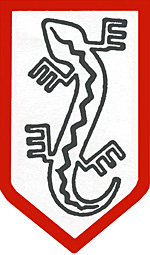Narodowe Siły Zbrojne
The Narodowe Siły Zbrojne ( NSZ ; German National Armed Forces ) were a Polish , anti-communist , Catholic-nationalist and anti-German underground organization in World War II and beyond. They were the third largest group in the Polish resistance in World War II. They were subordinate to Tymczasowa Narodowa Rada Polityczna until 1944 , which was created after the break in Stronnictwo Narodowe and then after another break in Rada Polityczna NSZ . The NSZ fought against the German and Soviet occupiers as well as against the Polish communists .
The NSZ was created on September 20, 1942 through the merger of Związek Jaszczurczy and the National Military Organization (NOW) . Their strength was over 75,000 men. Part of the NSZ merged with the Armia Krajowa in March 1944 and has been called NSZ-AK since then. The part of the NSZ that had spoken out against the merger has since been called NSZ-ZJ ("Związek Jaszczurczy" or "Lizard League"). NSZ units also took part in the Warsaw Uprising . On August 9, 1943, a unit of the Armia Ludowa was disarmed and executed near Borów in retaliation for the murder of some NSZ soldiers by Soviet partisans .
In January 1945 the NSZ-ZJ Brigade Brygada Świętokrzyska (around 1,500 soldiers) withdrew from the Red Army in the Reich Protectorate of Bohemia and Moravia with the consent of the Germans . There, on May 5, 1945, shortly before the arrival of the Americans, she liberated the Holeischen women's concentration camp and has since been viewed by the Americans as an ally . It was moved to Bavaria , where it was used to guard German prisoners of war ( Polish Guard Company ).
The last NSZ units in Poland merged with the National Military Organization (NOW) to form the National Military Association (NZW) in 1946 and were crushed by the Milicja Obywatelska and the secret service of the People's Republic of Poland in the mid-1950s . After the war, the soldiers of the NSZ belonged to the so-called " expelled soldiers ".
On January 1, 1988, the Polish exiled President Kazimierz Sabbat declared by decree: The soldiers of the NSZ were fulfilling their national duty for the Republic of Poland .
NSZ and NZW units are responsible for numerous retaliatory measures against national minorities during and after World War II. These include the so-called "railway campaigns". These were raids on trains carrying repatriates from the Soviet Union, in which Jewish Bolsheviks were murdered. Attacks on villages inhabited by Orthodox Christians in north-eastern Poland with numerous civilian casualties are also documented.
Commanders
- Colonel Ignacy Oziewicz , September 20, 1942 - June 1943
- Major General Tadeusz Kurcyusz , August 1, 1943 - April 22, 1944
- Colonel Stanisław Nakoniecznikoff-Klukowski , April 22, 1944 - July 24, 1944
- Lieutenant General Tadeusz Jastrzębski , July 24, 1944 - October 1944
- Colonel Stanisław Nakoniecznikoff-Klukowski, October 1944 - October 18, 1944
- Lieutenant General Zygmunt Broniewski , October 20, 1944 - August 1945
- Lieutenant Colonel Stanisław Kasznica , August 1945 - February 15, 1947
Web links
Footnotes
- ^ Hanna Konopka; Adrian Konopka. Leksykon historii Polski po II wojnie światowej 1944-1997 . Count point. P. 130. ISBN 978-83-87988-08-1 .
- ^ The Legalization of the NSZ in Exile , (Polish) accessed on December 14, 2010.
- ^ Józef Adelson: W Polsce zwanej Ludową . In: Jerzy Tomaszewski (ed.): Najnowsze dzieje Żydów w Polsce w zarysie (do 1950 roku) . PWN, Warszawa 1993, p. 393 .
- ↑ Informacja o ustaleniach końcowych śledztwa S 28/02 / Zi w sprawie pozbawienia życia 79 osób - mieszkańców powiatu Bielsk Podlaski w tym 30 osób tzw. furmanów w lesie koło Puchał Starych, dokonanych w okresie od dnia 29 stycznia 1946r. do dnia 2 lutego 1946. In: Instytut Pamięci Narodowej . Retrieved April 7, 2019 .

